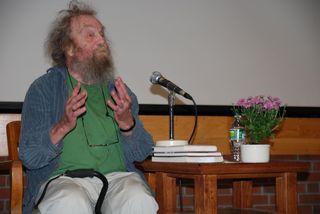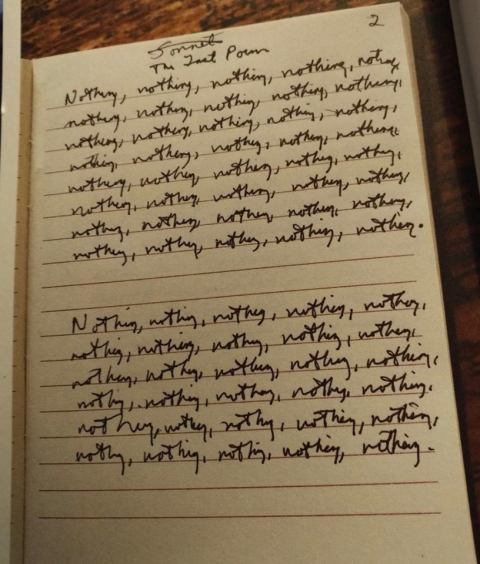A Further Serendipity: Concerning Having Nothing to Write
 I doubt there’s a writer who doesn’t experience times when there seems to be nothing to write. I’d wager, though, that that block or absence of inspiration often isn’t so much a lack of some subject as much as the result of some paralyzing judgement by that tyrannical Inner Editor every writer has that this or that matter isn’t worth writing about or that the writer, for whatever reason, just isn’t up to doing it justice.
I doubt there’s a writer who doesn’t experience times when there seems to be nothing to write. I’d wager, though, that that block or absence of inspiration often isn’t so much a lack of some subject as much as the result of some paralyzing judgement by that tyrannical Inner Editor every writer has that this or that matter isn’t worth writing about or that the writer, for whatever reason, just isn’t up to doing it justice.
Yesterday, the late Donald Hall‘s last poem in his notebook popped up in my newsfeed:

Here, Hall turns the Inner Critic’s answer to the question of what’s worth writing about around, a witty if somewhat bitter solution to the problem.
Then, today, I chanced to read these remarks of Allen Ginsberg on William Carlos  Williams facing the same void:
Williams facing the same void:
He’s almost dying, he’s got one foot in the grave (at that time, actually, he was saying, “I’ve got one foot in the grave”). And he thought he had cancer of the anus, actually, at that point. He was very sick, and he was also morbidly fantasizing, and he thought he didn’t have much to write about. (Around that time, I went to see him and he said he had nothing to write about – what can he write about? the cancer of his behind? – I think I mentioned this before). And I said, “Oh, there’s hundreds of young poets in America who would be interested in your behind! – Yes, of course, write about cancer in your behind, anything you can”.
Here, I’d argue, is a different response to the Inner Critic, one that tosses out its conventional, aesthetic criteria for some that are more radical, more ontological: what’s there to write about? Whatever there is to write about.

The relevance of “what is” strikes us too late and so as a nostalgia. But grasping it in real time turns “now” into an exercise in metaontology. “Do any human beings ever realize life while they live it–every,every minute?” Emily Webb, Our Town.
Stourleyk, your point is well-taken, re the brain-cracking consideration of being-as-presence or the phenomenology of internal time consciousness.
My point is that a wealth of subject matter is present-ed to the poet, and it’s only perverse aesthetic (with a nod to that word’s etymology) criteria that winnow it down to nothing. Ginsberg’s virtue, here, was to relax that restricting “ought” closer to “is”, so that whatever is in fact given in what time or temporality we have becomes potential matter for composition.